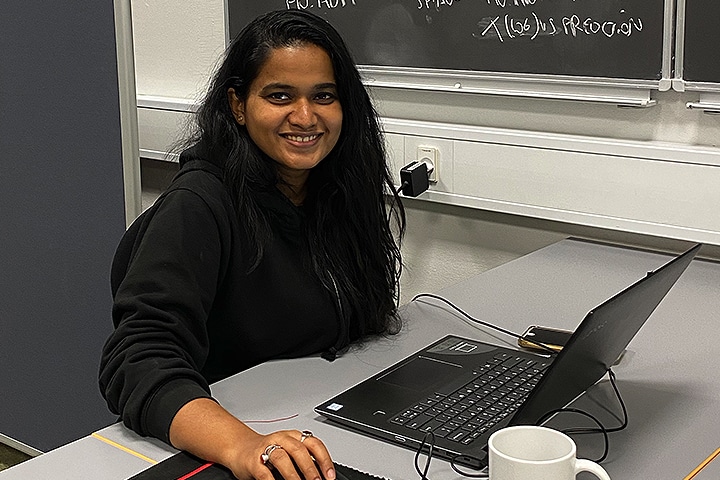No room for making mistakes when it’s about saving lives
14-12-20

Shanta Deb from Bangladesh was in Esbjerg for two years to study for a Masters in Risk and Safety Management at Aalborg University. At home, she works as a safety inspector to secure a safe workplace for her country’s garments factories.
By Camilla Qvistgaard Madsen and Jeppe Vestergaard Nielsen for Globalnyt.dk. Read the article and hear the podcast with Shanta Deb (in Danish).
The first time we met Shanta Deb was on a cold day in January. Our meeting took place at Aalborg University in Esbjerg just a few days before she was handing in her master’s thesis.
I am working every day until 10 pm. I often just go home to eat and then I continue working. That’s how it’s been for the last couple of months, she said with a chuckle.
Shanta Deb and three of her colleagues were in Denmark with Danida’s support. As part of Denmark’s strategic sector corporation, the Danish government funds courses including master courses for people who work in fields that will gain their home countries.
Shanta Deb and her three colleagues were all enrolled at Aalborg University to study Risk and Safety Management.
We are taught how to make risk analysis, do accident probability calculations and evaluate safety in the workplace, she said.
The garment factory that collapsed
It is not by chance that Shanta Deb and her colleagues were studying Risk and Safety Management.
In Bangladesh, she is a labour inspector, which is similar to being employed at the agency for Work Environment in Denmark. It is her job to visit factories and check whether the workplaces have adequate risk and safety measures in place.
Unfortunately, too many accidents have happened in the factories due to lack of safety measures, so our government has increased the number of labour inspectors like myself
One of the worst accidents was in April 2013 when Rana Plaza, a nine-storey garment factory just outside the capital Dhaka, collapsed in seconds. It caused the tragic death of 1,134 textile workers and put the national and international spotlight on ensuring safe factories in Bangladesh.
It was catastrophic. That day was like no other. Too many people lost their lives, says Shanta Deb.
The garment industry is crucial
Rana Plaza was one of the worst but by no means the only accident that has occurred in Bangladesh’s many garment factories. Such factories are at the heart of the country’s economy. With 4,500 garment factories and about 3.5 million employees, the textile industry accounts for about 80% of the country’s total exports. By far the greatest number of textile products are destined for the USA and Europe. Bangladesh produces garments for big brands such as H&M, Zara, Gap and United Colors of Benetton.
The extent of the Rana Plaza disaster made it difficult for the authorities in Bangladesh and the rest of the world to ignore the problems in the garment industry.
2013 was a wake-up call for all of us. After the disaster, the authorities started modernising the Department of Inspection for Factories & Establishment under Bangladesh Ministry of Labour & Employment where I work.
Shanta Deb told us that Bangladesh now has about 350 labour inspectors, who try to ensure safe factories in Bangladesh.
There have been a lot fewer factory accidents in recent years. The authorities are trying to put an end to the problems. One of the ways is by sending us to Denmark so that we can improve the department’s work.
From Bangladesh to Esbjerg
There are two things in particular that Shanta Deb and her colleagues have learnt and will be bringing home to Bangladesh. The first concerns their study environment.
Our master’s course is full of people from all over the world, everyone with their own personal experience and opinions about specific issues. I have really learnt to see a problem from many angles and I think it has made me smarter.
The other thing that Shanta Deb will bring back is some concrete tools to use in the factories at home.
I have learnt how to work with advanced data so that I can categorise accidents that occur in the factories. In doing so, I will be able to spot the most frequent kinds of accidents and use this data as the basis for making specific guidelines. These guidelines will help prevent future accidents.
Going home
Next time we met Shanta was at Copenhagen Airport where she was checking in her bulging suitcase.
Her master’s thesis was delivered, she had defended it and now it was time to go back home after her two years in Denmark. Shanta Deb got top marks for her thesis and even though she was proud, there was much more at stake for her.
It has been very important for me to do my level best because I was not only studying for my own benefit. I was studying so that I can help to improve the conditions for the factory workers in my home country. That is why I have kept on saying there was no room for mistakes.
Today: Back in the job as a safety inspector in Bangladesh, where she uses her master’s degree to ensure safe factories in Bangladesh.
Read about the other podcasts with Danida alumni
Translated from Danish by Kate Girvan.
Go back to our stories